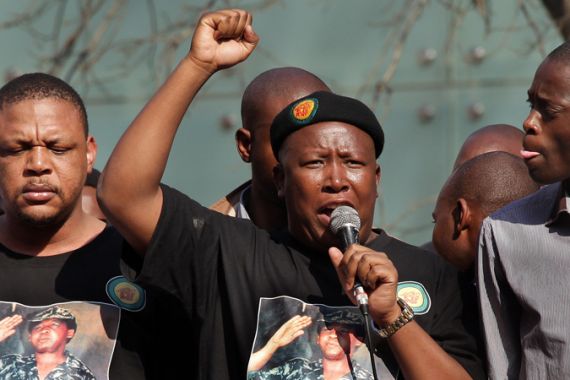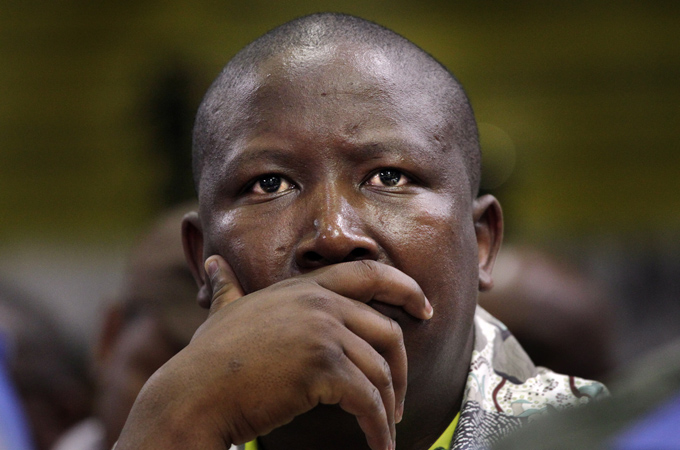Re-racialising South Africa’s politics
The African National Congress, once a bastion of non-racism, has recently descended into racial politics.

 |
| ANC youth leader Julius Malema was convicted of hate speech for singing ‘Shoot the Boer’ [EPA] |
The recent court judgment in a South African court declaring the singing of a popular liberation struggle song, “Shoot the Boer”, as hate speech has brought renewed attention to the racial dynamics that are so pervasive in this society. While no one should be surprised that race informs so much of the political discourse in a country with a history such as South Africa’s, the increasingly antagonistic nature of this discourse should be a matter of concern to all South Africans – as well as to those who seek to hold the South African “miracle” as an example of a country dealing successfully with the trauma of more than 300 years of colonialism and apartheid.
The “miracle” transition that South Africa experienced in the mid-1990s was extraordinary, in the sense that an oppressed population, having suffered the brutality of an inhuman system of apartheid and colonialism since 1652, felt not the slightest need for revenge, wide-scale violence or the expulsion of their white compatriots. This is especially notable – bordering on miraculous – given the fact that the transition itself was marked by a level of violence against black communities not even seen at the height of apartheid rule.
And yet we are now witnessing a racialisation of South African politics that is extremely dangerous and threatens to take us down a route of racial antagonism, the outcome of which we are unable to predict. Needless to say, history is replete with examples of miraculous transitions gone horribly wrong. It is about time that South Africans are liberated from their false exceptionalism – the idea that we are really different from all those other countries where the potential for fundamental transformation was swept away by the discourse of race, ethnicity, and tribe.
The relatively peaceful nature of the political transition in South Africa has been variously ascribed to the greatness of the political leaders of the two principled political formations, the African National Congress’ Nelson Mandela and FW De Klerk, the leader of the apartheid National Party. While Nobel Peace Prizes are awarded to great men such as Mandela and De Klerk, the real motive force behind the peaceful transition, and the absence of a race war in South Africa, was the African National Congress.
While it has become fashionable for everyone to preach non-racialism in contemporary South Africa, the ANC was the only major political party, together with its communist allies, that preached an unflinching non-racism for most of its 100-year history. Its adoption of the Freedom Charter in 1955 cemented the non-racialism of the ANC and provided the political platform on which the organisation challenged the apartheid system in the ensuing four decades. During its long years in exile, the ANC expelled prominent black members who preached a racially-defined struggle, suffered a significant breakaway with the formation of the Pan-Africanist Congress by disenchanted Africanists, and had to explain to thousands of angry youth, fresh from the battles of Soweto in 1976, why the struggle against apartheid was not a struggle of black against white.
Although race has been one of the fundamental contradictions of South African society, and its most apparent one at that, the ANC never based its political programme on pitting one race against another. The presence of white, coloured and Indian leaders in the ANC was never a token presence. Anyone who witnessed the reverence with which Joe Slovo, the white chief of staff of the ANC’s military wing, was received in South Africa’s townships would easily dispel that notion.
|
“What has thus far been a blessing to South Africans, and the main factor in preventing a racial polarisation, might now become a part of the racialisation of South African politics.“ |
Traumatised and divided societies often have one institution that commands the respect of a vast majority of the populace. These institutions are key centres around which transformative political projects can coalesce. In Latin America, the church often played this role in the struggle against the right-wing dictatorships; likewise, the monarchy in Spain after the death of Franco, the military in Egypt, and the clergy in Iran during the 1979 revolution provided the institutions and legitimacy that profound changes in these countries required. In South Africa, the ANC has historically played this role without wavering. The cohesion of the South African political system remains dependent on the cohesion of the ANC, and the continued commitment of the ANC to its legacy of non-racialism. Whatever opposition parties or the chattering classes say, there is no institution that commands the level of historical loyalty and legitimacy as this organisation.
What has thus far been a blessing to South Africans, and the main factor in preventing a racial polarisation, might now become a part of the racialisation of South African politics. The fact that most opposition parties represent the interests of particular racial groups, despite their protests to the contrary, means that they can never have the impact of a party such as the ANC. It is in this light that the emergence of an openly racial discourse within the ANC, and the organisation’s increased use of racial categories, becomes disconcerting.
The utterances by the ANC government’s chief spokesman Jimmy Manyi earlier this year, targeting the minority coloured community, and the ruling party’s subsequent attack on cabinet minister Trevor Manuel for defending the non-racism of the ANC against Manyi’s ethnic politicking, is indicative of at least a tolerance for racial politics within the organisation.
The ANC’s knee-jerk response to any criticism, blaming white interests or parties, and an automatic defence of ministers, party leaders or judicial candidates because they are black, intensifies this polarisation. Of course there are lots of white racists in South Africa, and race clearly remains a fundamental factor in the distribution of resources and opportunity in the country. This does not mean that all criticism of the ANC is based on race, or that our defence against such racism must mimic the very racial categories we are trying to defeat. Certainly, black South Africans also deserve competent ministers, judges and civil servants. Even in the Western Cape province, where the ANC lost power to the opposition Democratic Alliance, the organisation is attempting to regain power by adopting the principles of ethnically-based mobilisation by focusing its efforts on the coloured community, which constitutes a majority of the population in this province. Non-racism has been overtaken by political expediency and the rush for power.
A non-racial South Africa cannot be built without a non-racial ANC, and the recent history of the organisation indicates that this dream is in danger of being washed away by a combination of populist Africanist rhetoric, ill-considered defence of whomever is black in government or the civil service – simply because they are black, and the adoption of racial mobilisation tactics. It remains to be seen whether an ANC that has lost its political moorings and its firm foundations of non-racism – and instead has become a battleground for factional and material interests – can reposition itself at the vanguard of the struggle for a non-racial society.
Let no one be fooled that this mantle can simply be picked up by any of the myriad of opposition forces. The death of non-racism in the ANC means the withering away of this dream for the country as a whole.
David Africa is an independent security analyst based in South Africa. He has previously worked in counter-terrorism intelligence and research, and served in the underground of the then-banned African National Congress in South Africa.
The views expressed in this article are the author’s own and do not necessarily reflect Al Jazeera’s editorial policy.
